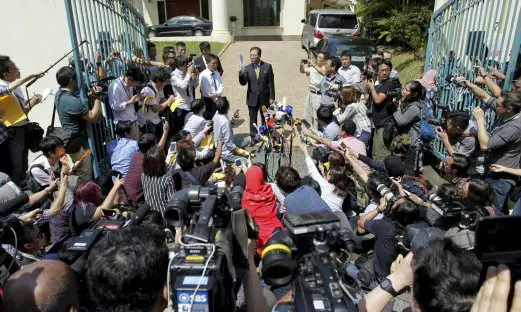The Catalan government has renewed its calls for dialogue to solve the independence crisis – but warned the rest of Europe that the issue will not disappear, even if the Spanish government makes good its threat to impose direct rule this week.
In an interview with the Observer, Catalonia’s foreign minister, Raül Romeva, said the government was ready for unconditional talks to find a way out of the impasse. “What we need is dialogue with the Spanish state,” he said.
“We need to sit down at the table without any preconditions. But the Spanish state needs to respond to this: if it doesn’t want to, it needs to explain why not. We’ve always said that if there’s a way to do it, either directly or through mediation, we’re prepared to do sit down and talk. I think that’s the way you do things in politics.”
The unilateral independence referendum held on 1 October has pitched Spain into its worst political upheaval since the country returned to democracy four decades ago. Although the Catalan president, Carles Puigdemont, pulled the region back from the brink on Tuesday by proposing that the effects of the declaration of independence be suspended for a few weeks to allow for dialogue, the Spanish government has said it will no longer tolerate Puigdemont’s disobedience nor his flouting of the country’s constitution and the rulings of its constitutional court.
In an ultimatum issued in the Spanish parliament on Wednesday, the prime minister, Mariano Rajoy, said Puigdemont had until Monday to confirm whether or not the region had made a unilateral independence declaration and until Thursday to rectify the situation and return Catalonia to “constitutional order”.
Failure to do so, said Rajoy, would result in the unprecedented invocation of article 155 of Spain’s 1978 constitution, which allows the government to take control of an autonomous region if it “does not fulfil the obligations imposed upon it by the constitution or other laws, or acts in a way that is seriously prejudicial to the general interest of Spain”.
Catalonia’s foreign minister Raul Romeva.
Romeva dismissed the threat of 155, saying the Spanish government had effectively activated the article already. “The problem is that the Spanish government is already applying 155,” he said. “That’s the trap: they threaten to apply 155 when they’re already applying it illegally … They’re already intervening in our finances but they’re doing it by the back door. And the presence in Catalonia of the Guardia Civil and the national police is illegal. They’re saying they’re defending the rules but they’re the ones breaking their own rules.”
He also rejected suggestions that the crisis could be solved by means of a commission on constitutional reform.
Last week Rajoy and Pedro Sánchez, the leader of Spain’s Socialist party (PSOE), appeared to offer the Catalan government a way out of the standoff by announcing a deal to establish a commission to examine the possibility of changing the way the country’s autonomous regions are governed through constitutional reform.
But Romeva said the initiative was designed to deflect attention from the wishes of the overwhelming majority of Catalans, who have said they want to be allowed to vote in a mutually agreed independence referendum.
“What 80% of the Catalan population is asking is that they have the right to decide. That’s what they’ve been saying very clearly – and peacefully – for years. I have yet to see any concrete proposal. I’ve heard some ideas on how we could begin to study the possibility that in the future there could be a commission. That’s not a concrete proposal.”
Romeva refused to speculate on what would happen on Monday, saying only: “We’ll see on Monday. We’re always talking. We’ll see what happens on Monday.”
However, Puigdemont’s government is under increasing internal and external pressure to show its hand. Its junior coalition partners, the far-left separatist party CUP, were not happy that the president stopped short of an outright independence declaration and are urging him to ignore the Spanish government and make a definitive proclamation of independence.
The Catalan national assembly, a powerful pro-independence civil society group, has also said that it no longer makes sense “to keep the suspension of the independence declaration”.
(GUARDIAN)
 简体中文
简体中文

